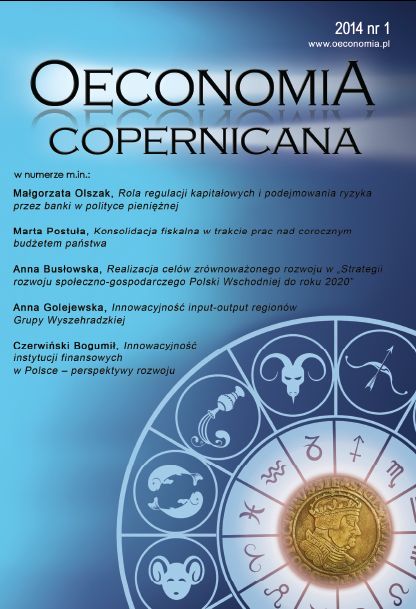Enterprise the view of managerial theories of the firm
DOI:
https://doi.org/10.12775/OeC.2014.009Keywords:
balanced rate of growth of the firm, Penrose effect, expense preference, interdependence of decisionsAbstract
The dominant role of corporations in modern economy and observed widespread oligopolization are the sources of practical need for the theoretical concept of the enterprise explaining the operations of large companies, with a particular focus on their primary objectives and aims, and the role they play in the markets. In this paper three concepts of the enterprise are discussed that take into account the changing conditions of the company. All the discussed concepts were formulated based on the managerial theory approach: the model of an enterprise that maximizes the sustainable growth rate of R. Marris, the model of an enterprise that maximizes revenue from the sales of W.J. Baumol and the model of O.E. Williamson that describes the preferences of managers in discretionary decision- making process. The aim of the publication is to present the managerial theory of the firm, which is alternative to traditional neoclassical concept of enterprise, their critical evaluation and an indication of application possibilities.
Downloads
References
Balcerzak A.P. (2008), Ekonomiczne konsekwencje intensyfikacji powiązań sieciowych w gospodarce globalnej, ?Acta Universitatis Nicolai Copernici ? Ekonomia?, nr XXXVIII.
Baumol W.J. (1959), Business Behaviour, Value and Growth, MacMillan, New York.
Berle A.A. Jr., G.C. Means (1932), The Modern Corporation and Private Property, MacMillan, New York.
Boehlke J. (2010), Firma we współczesnej myśli ekonomicznej. Studium teoretyczno ? metodologicznej, Wydawnictwo Naukowe UMK, Toruń.
Dobson S., G.S. Maddala, E. Miller (1995), Microeconomics, McGraw-Hill Book Company Europe, Berkshire.
Domańska E. (1986), Kapitalizm menedżerski, Państwowe Wydawnictwo Ekonomiczne, Warszawa.
Gorynia M. (1999), Przedsiębiorstwo w różnych ujęciach teoretycznych, ?Ekonomista?, Nr 4.
Gruszecki T. (2002), Współczesne teorie przedsiębiorstwa, Wydawnictwo Naukowe PWN, Warszawa.
Haveman R., G. De Bartolo (1970), The Revenue Maximization Oligopoly Mode: Comment, ?American Economic Review?, Vol. 58, No. 5.
Jones T. (2004), Business Economics and Managerial Decision Making, John Wiley and Sons, West Sussex.
Koutsoyiannis A. (1979), Modern Microecnomics, McMillan, London. Machlup F. (1967), Theories of the Firm: Marginalist, Behavioral, Managerial, ?American Economic Review?, Vol. 57, No. 1.
Marris R. (1964) The Economic Theory of Managerial Capitalism, MacMillan,
Marris R. (1963), A Model of the ?Managerial? Enterprise, ?Quarterly Journal of Economics?, Vol. 77, No. 2.
Penrose E.T. (1959), The Theory of the Growth of the Firm, Basil Blackwell, Oxford.
Peston M.H. (1959), On the Sales Maximisation Hypothesis, ?Economica?, Vol. 26, No. 102.
Sandmeyer R.L. (1964), Baumol?s Sales-Maximalization Model: Comment, ?American Economic Review?, Vol. 54, No. 6.
Williamson O.E. (1970), Corporate Control and Business Behavior: an Inquiry into the Effects of Organization Form on Enterprise Behavior, Prentice Hall, New York.
Williamson O.E. (1964), The Economics of Discretionary Behaviour: Managerial Objectives of the Theory of the Firm, Englewood Cliffs, Prentice-Hall Inc, New York.
Williamson O.E. (1963), Managerial Discretion and Business Behaviour, ?American Economic Review?, Vol. 53, No. 5.






